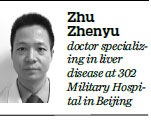Doctor training key in remote areas
I have been to the Tibet autonomous region and Qinghai province five times since 2015 to work with local medical workers for diagnosis and treatment of echinococcosis - a parasitic infection that spreads from animals to humans. Before that, I had only been to Tibet once for a holiday.
The first time I arrived in Tibet as a doctor, sent by 302 Military Hospital, was in November 2015. I worked at Saga Hospital in Saga county. My mission was to examine and diagnose residents suspected of having the disease.
On my first day of work I was shocked to find so many people waiting to be seen at the hospital. There must have been more than 200, and they were in different age groups, from children to seniors. There was a girl whose belly was swollen as big as a soccer ball due to the disease.

In places like Beijing, it is rare to receive a patient with such a disease. The scene startled me.
I remember 91 of the patients were diagnosed with the disease using ultrasonic testing. More than 30 of them, who were in more serious condition, were sent to Beijing to receive surgery at our hospital.
The living environment in Saga county, at a altitude of about 4,600 meters, was really harsh. It was winter and very cold, and I had difficulty falling asleep at night because of altitude sickness. I would wake up once every hour.
I stayed in the county for four days and returned to Beijing. After that, I have been to other areas in Tibet and Qinghai, and stayed as long as half a month.
The disease is usually transmitted through contact with wild dogs, so giving vaccines to dogs will help control and prevent it. Personal hygiene is also important.
The treatment of echinococcosis is very difficult because it is hard to separate infected tissue from healthy tissue during surgery. And recurrence is likely after treatment, with transfer of the disease to other parts of the body, so follow-up checks are also necessary.
In many hospitals in Tibet, doctors can only treat patients with less severe conditions due to lack of skills and equipment. Many people with serious conditions have to be sent away for treatment.
I think progress is being made in Tibet in the prevention and control of echinococcosis. More people have changed their eating habits and taken to eating cooked food. But it is urgent to improve the training of local doctors to help them diagnose and treat the disease.
Zhu Zhenyu was talking to Wang Xiaodong.




























